



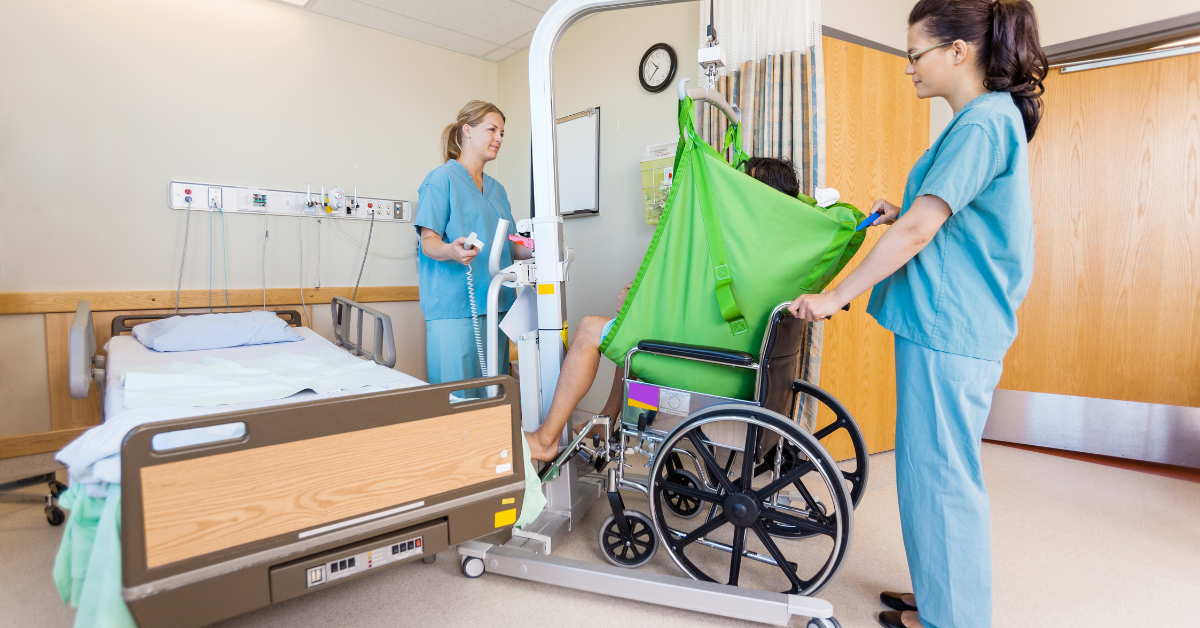
As you get older, more people find themselves at home with their loved ones taking care of them. Patient lifts for home use have become more common.
They are helpful to transport loved ones who have limited mobility to and from bed, wheelchair, or the bathroom. Here are the 5 important things to know about patient lifts.
What are Patient Lifts used for?
Patient lifts help safely transfer immobile patients from one place to another. They reduce the physical effort required to move the patient, reducing the risk of injury to caregivers. Modern lifts are compact and can easily maneuver around tight spaces in the patient’s home. They are available in a wide variety of configurations to meet the needs of the patient and caregiver. |
|
Patient Lifts – The Basics
Manual medical lifts use levers and hydraulic pumps to reduce the effort required by the caregiver to move the patient. They are affordable and lightweight but not well suited for caregivers with limited strength. Powered lifts use rechargeable batteries and require virtually no effort from the caregiver. They are ideal for heavier, larger patients and home situations with a single caregiver for the patient. A powered lift allows the caregiver to use one hand to operate the lift while the other steadies the patient. Each lift has a maximum weight capacity which absolutely must not be exceeded. Heavy duty lifts feature reinforced construction to accommodate patients who weigh more than 350 pounds. Most bariatric lifts have a weight capacity of 650 lbs but the Hoyer® Calibre lift has a safe working load of 850 pounds. |
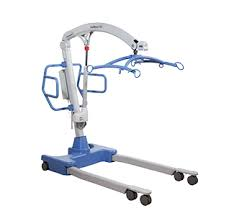
Joerns Hoyer® Calibre Electric Bariatric Patient Lift
|
Patient Lifts – Bottom Parts
Patient lifts commonly have an adjustable U-shaped base. The base legs can be moved close together to move through doorways and around furniture. The lift is able to position the patient over the toilet when the base legs are moved apart. Caregivers can adjust the base with a manual lever or electronic controls depending on the model. Powered bases are more expensive but they eliminate the twisting/bending movement required to manually adjust the base width. Caregivers can effortlessly open and close the powered base legs of the Invacare Reliant 600 by using buttons on the hand pendant. |
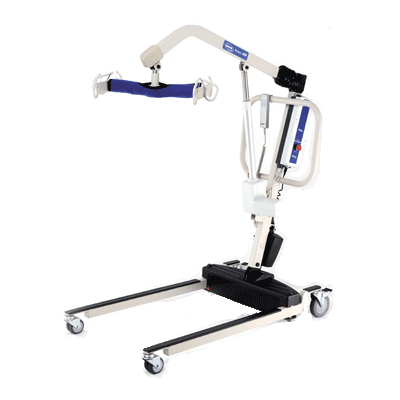
Invacare Reliant 600 HD Patient Lift with Power Opening Base
|
Features
Integrated digital scales are beneficial for patients with heart or kidney disease who require accurate daily weight monitoring. Ergonomic push handles are helpful to reduce the effort required by caregivers to move and lift the patient. Some lifts may be folded or taken apart for storage or transport. The Proactive Protekt® Take-A-Long Folding Electric Patient Lift folds to fit into most automobile trunks for travel. The dual rear locking casters allow the lift to be transported in its folded configuration. |
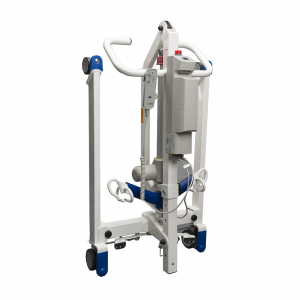
Proactive Protekt® Take-A-Long Folding Electric Patient Lift
|
Patient Lifts – Upper Parts
The mast is the vertical bar mounted to the lift base that holds the push handles and electronic controls. The top of the mast is connected to the boom, which is the horizontal piece across the top of the lift. The lifting range depends on the design of the mast and boom. Some models can lift the patient from the floor and reach up to 66” high beds. The arched design of the Drive Medical Levantar® boom allows a 500 lb patient to be lifted from the floor to a 76” high bed. The patient sling attaches to the spreader bar on the end of the boom. Spreader bars are available in various configurations with 2, 4 or 6 connection points for fastening the sling. Wide spreader bars with 6 connection points provide the most support and are most comfortable for adult patients.
|
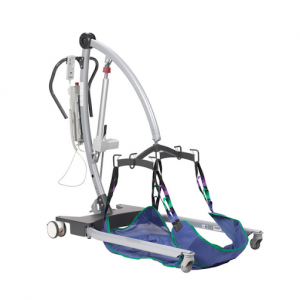
|
Sling Options
Patient lift slings are available in a wide variety of material, styles and weight capacities to lift patients safely and comfortably. Caregivers must assess the patient’s needs and ensure that the sling is compatible with the lift. Some slings require straps for connecting to the spreader bar while others do not. It is important to note that lift slings are not interchangeable with stand-up slings as their designs are very different. Padded slings are recommended for patients with fragile or sensitive skin. Polyester materials are easily cleaned and help prevent spread of infection. They also minimize friction to protect the patient’s skin. Polyester mesh is breathable and dries quickly, making it ideal for bathing or showering.
|
|
| *The physician and therapy team must be consulted before choosing a patient lift and sling. Training is required to use lifts safely to prevent injury to patients and caregivers.* |
Overall, with this article I hope you can get to answer most of the questions you have about patient lifts. Knowing about a lifts parts from top to bottom, features and sling options can help you make the right decision for you or your loved ones’ home environment.
At HomeCare Hospital Beds we want to help you make an informed decision.
If you have any questions about which lift is a good choice for you, please contact our HomeCare Hospital Beds team so we can help you make the right choice.
Call us today toll free at 877-414-0002 or email us at info@homecarehospitalbeds.com.




| Cookie | Duration | Description |
|---|---|---|
| cookielawinfo-checkbox-analytics | 11 months | This cookie is set by GDPR Cookie Consent plugin. The cookie is used to store the user consent for the cookies in the category "Analytics". |
| cookielawinfo-checkbox-functional | 11 months | The cookie is set by GDPR cookie consent to record the user consent for the cookies in the category "Functional". |
| cookielawinfo-checkbox-necessary | 11 months | This cookie is set by GDPR Cookie Consent plugin. The cookies is used to store the user consent for the cookies in the category "Necessary". |
| cookielawinfo-checkbox-others | 11 months | This cookie is set by GDPR Cookie Consent plugin. The cookie is used to store the user consent for the cookies in the category "Other. |
| cookielawinfo-checkbox-performance | 11 months | This cookie is set by GDPR Cookie Consent plugin. The cookie is used to store the user consent for the cookies in the category "Performance". |
| viewed_cookie_policy | 11 months | The cookie is set by the GDPR Cookie Consent plugin and is used to store whether or not user has consented to the use of cookies. It does not store any personal data. |